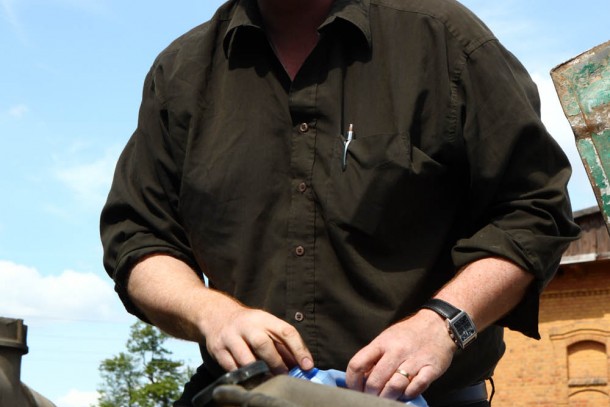29.07.2009 | Insight

Bengt Sandberg is made of different stuff. He transforms from the quick-witted managing director of Sandberg Ltd into a handy woodsman in the blink of an eye. After a morning at the office, he surprises us by climbing into the control room to operate the chipping machine.
We are now in Gvardeysk, east of Kaliningrad, where the village roads are lined with piles of logs. Sandberg demonstrates how turning water-damaged logs into chips is child’s play.
“We plan to clear brush, clean ditches and cut wood to supply chips for both local bio fuel boilers and cogeneration plants in Sweden. There are some 47 million cubic metres of forest in the Kaliningrad region and an annual growth of around 900,000 cubic metres means there is no danger of running out of raw material,” Bengt Sandberg says.
Since a part of the forests of north-western Kaliningrad lies as much as seven meters below sea level, the area requires effective ditching and continuous draining. As we approach the woods in Polessk, we can see how silted ditches cause small lakes, which results in water damage to trees. Unfortunately, timber damaged in this way does not meet the paper industry’s quality standards, which means that in these cases Sandberg can use both the logging residue and the logs themselves for energy generation. However, drainage and investment in planting must also be carried out in order to regenerate the forests and secure their future growth.
“We estimate that 20 to 30 per cent of the wood chips could be used locally but since there aren’t enough heating plants here in Kaliningrad that can use them, we have to export the rest to Sweden for use in cogeneration plants there,” Sandberg says.
However, Sandberg Ltd is planning to invest in local heating plants in the long run to facilitate a transition from coal or heavy fuel oil to bio fuels. Some 100,000 cubic metres of forest are required in order to produce 300,000 cubic metres of chips. The Russian state requires advance payment of the rent on the forests Sandberg is planning to lease and cut in the near future, which means that he needs external financing to complete the project.
Since the project has the potential to reduce carbon dioxide emissions by around 77,000 tonnes per year, NEFCO is financing the project with Fortum Värme, Sandberg Ltd and Gustafsborgs Säteri AB. Fortum Värme has agreed to handle customs clearing and shipping of the chips to Sweden.
A large number of state-owned forests were handed over to regional ownership when a new forest law came into force in Russia in 2007. This paved the way for the leasing of forests and has made businesses like Bengt Sandberg’s possible. This also means that the regional administration in Kaliningrad can use local and renewable resources for energy production, which in the long run could end its dependence on imported coal and oil.